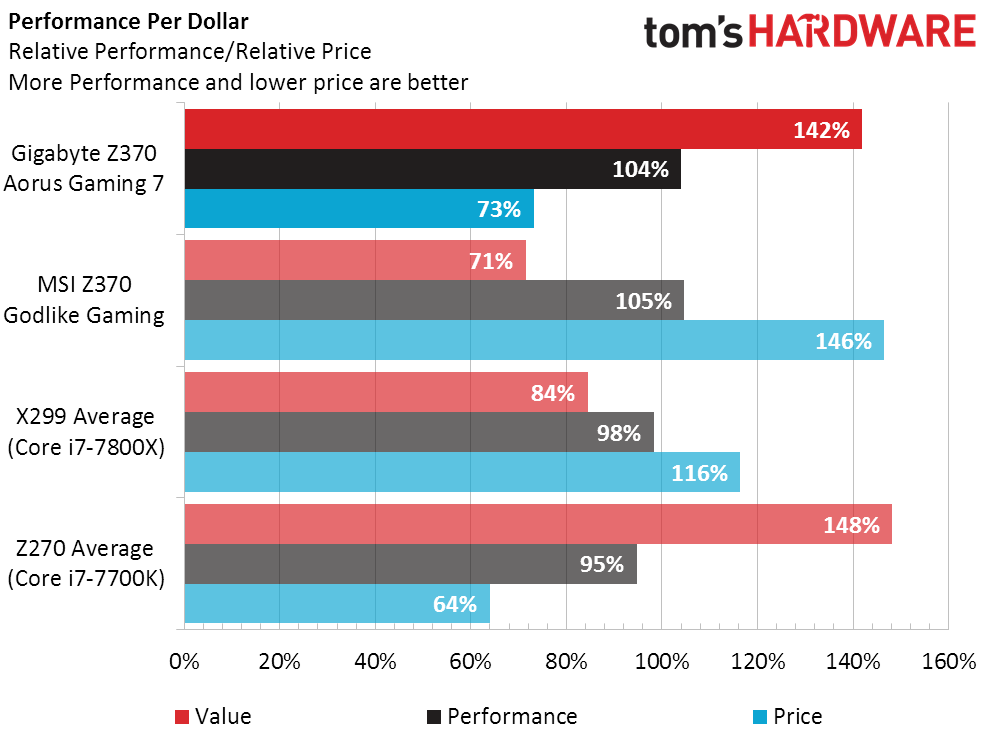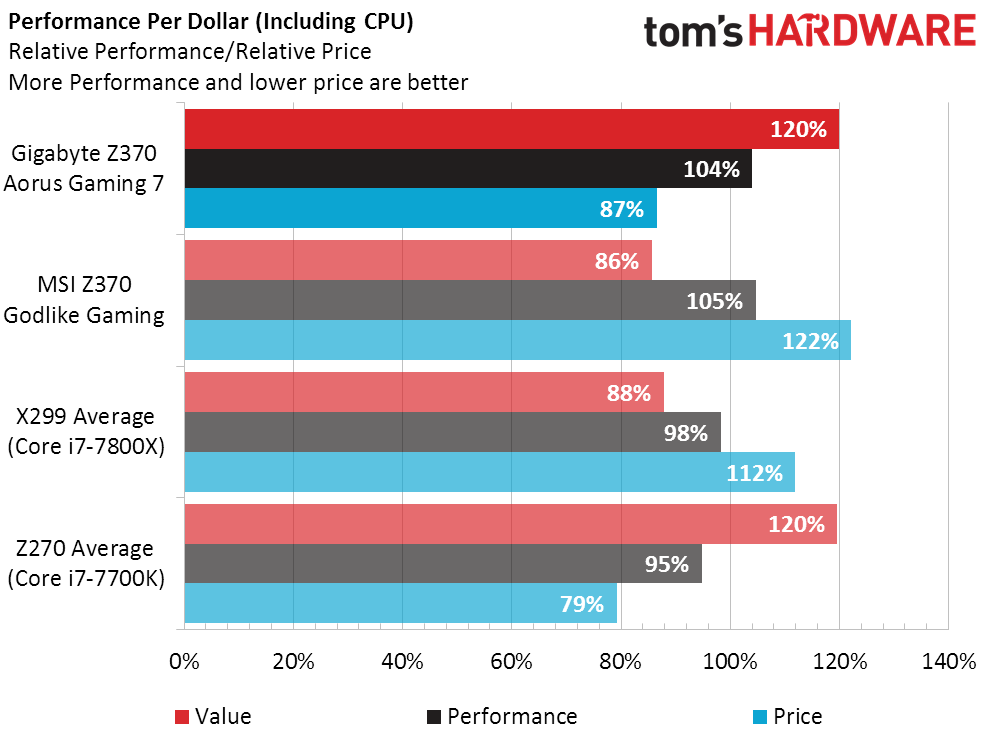Gigabyte Z370 Aorus Gaming 7 ‘Coffee Lake’ Motherboard Review
Why you can trust Tom's Hardware
Benchmark Results & Final Analysis
The MSI Z370 Godlike Gaming sets the initial comparison data set for Z370 platforms using the Core i7-8700K. Data from the 8700K’s predecessors is an average of all previous tests from this lab, which includes every Z270 and our initial batch of X299 motherboards (later X299s were tested exclusively using the higher-model 7900X).
Synthetic Benchmarks
Synthetic benchmarks are great diagnostic tools, and show a small lead for the competing MSI board, which is appropriate for its 0.5 MHz BCLK overclock. Since we’re always looking for apples-to-apples comparisons, we’re looking at a wash.
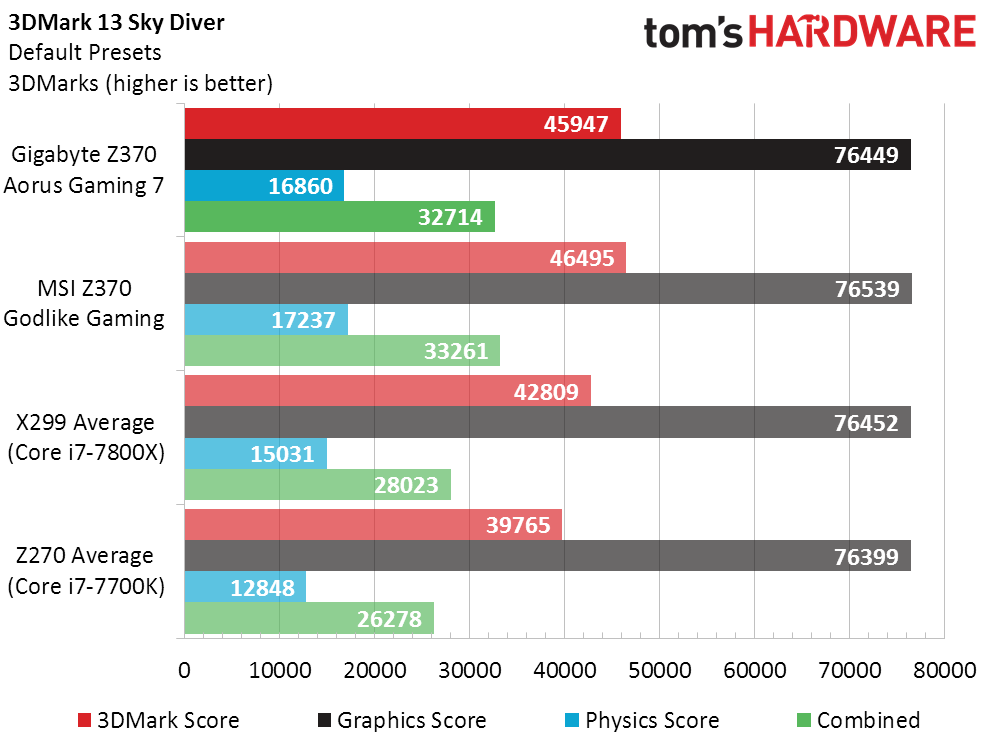
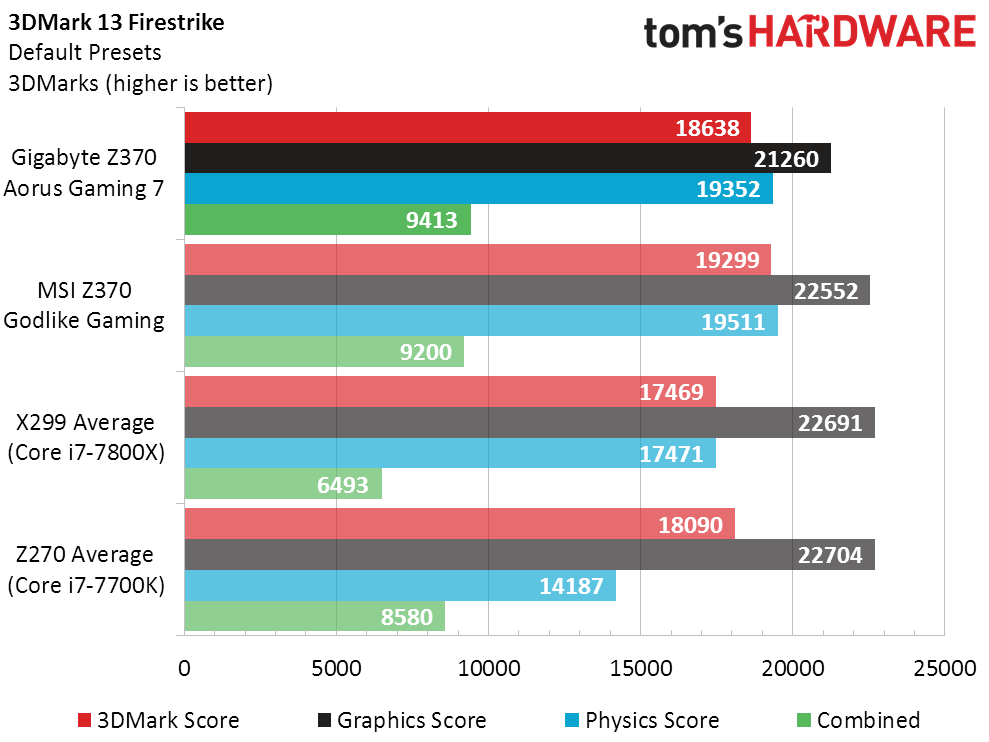
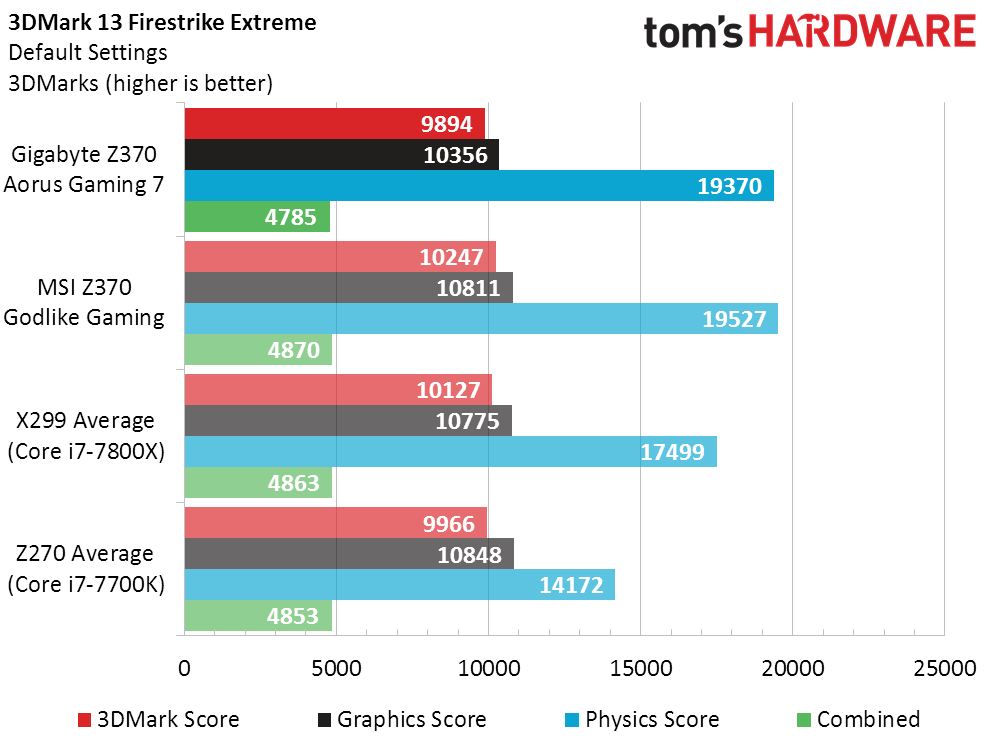
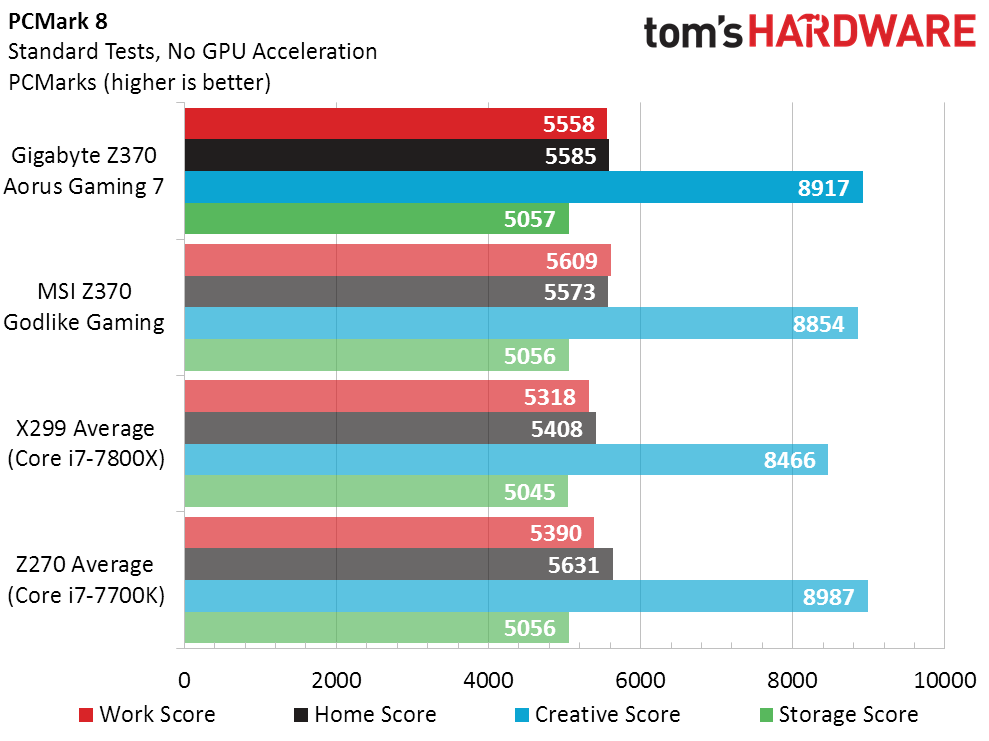
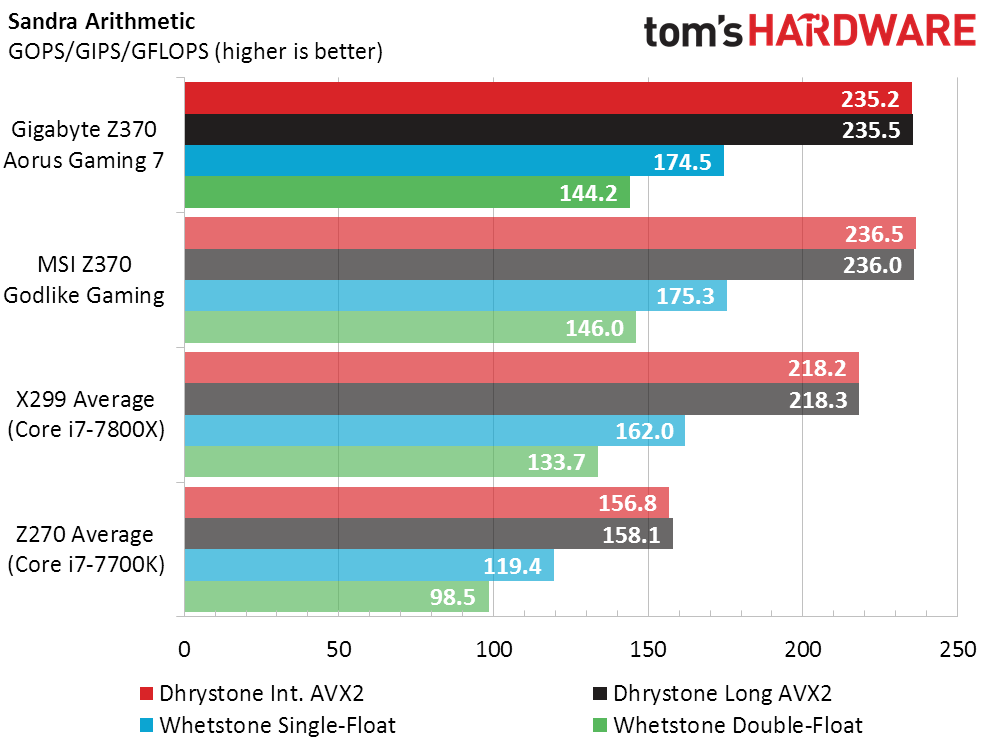
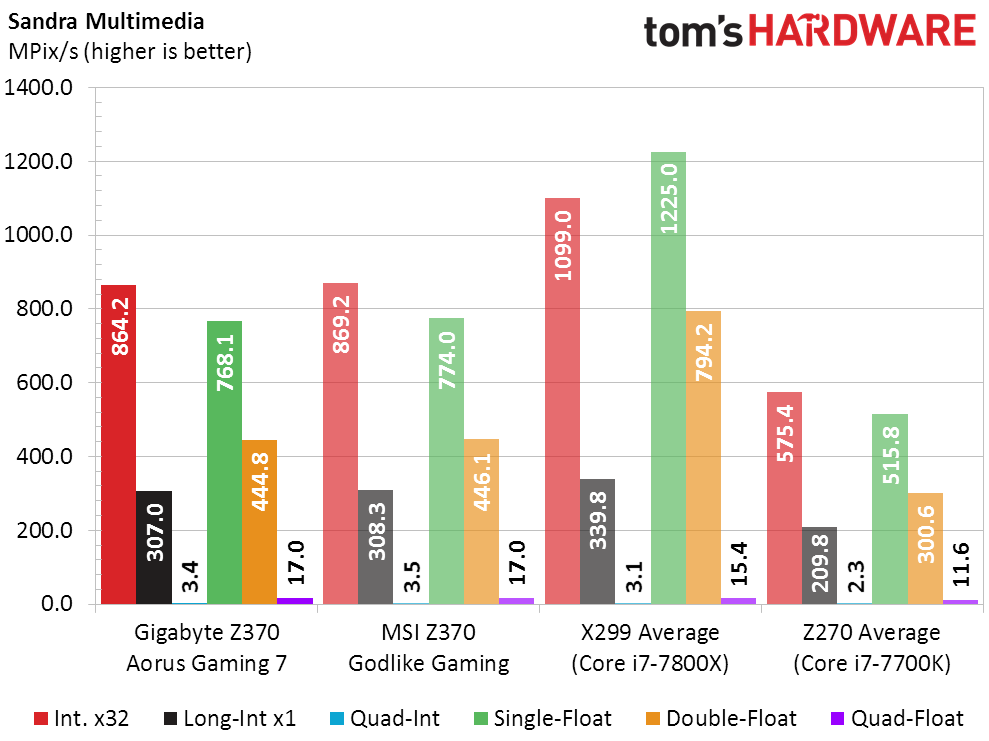
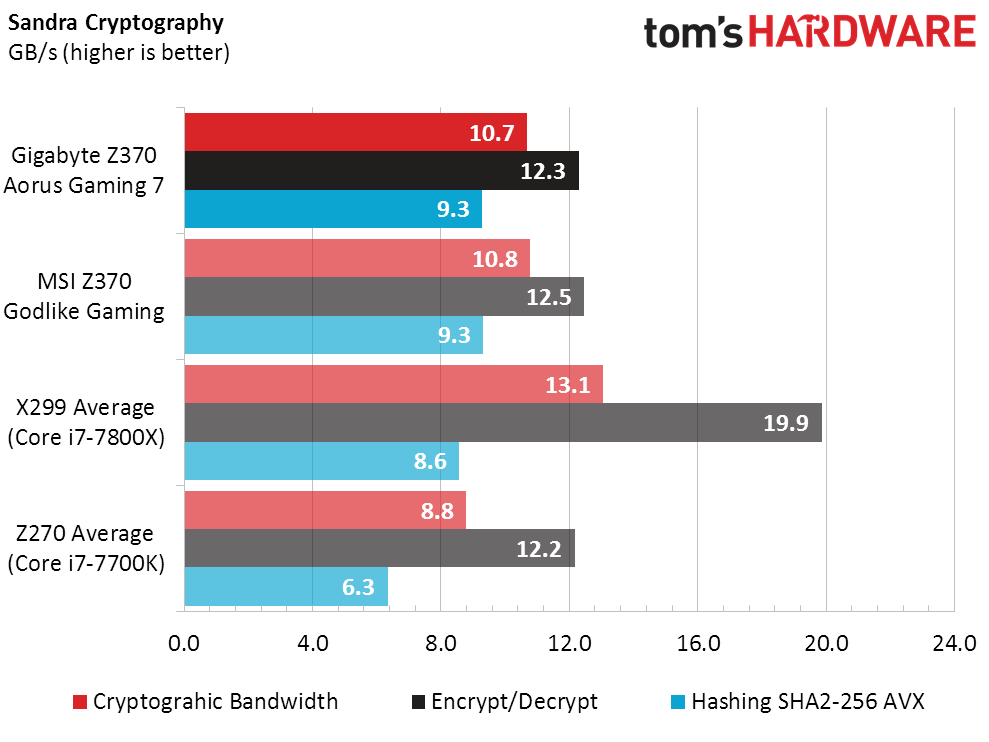
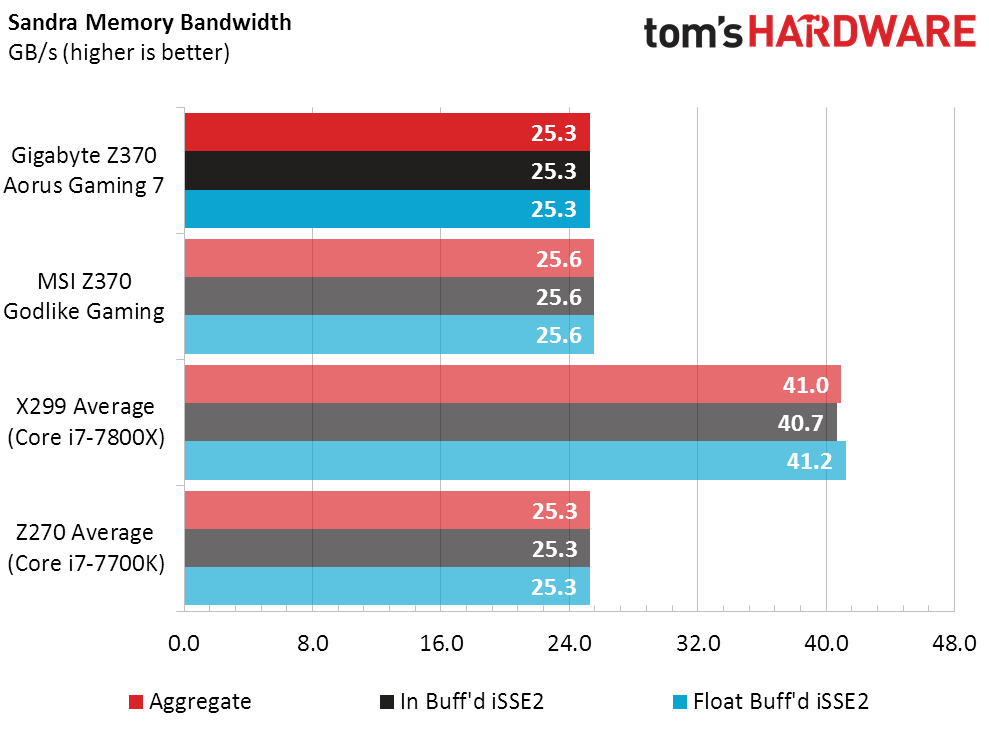
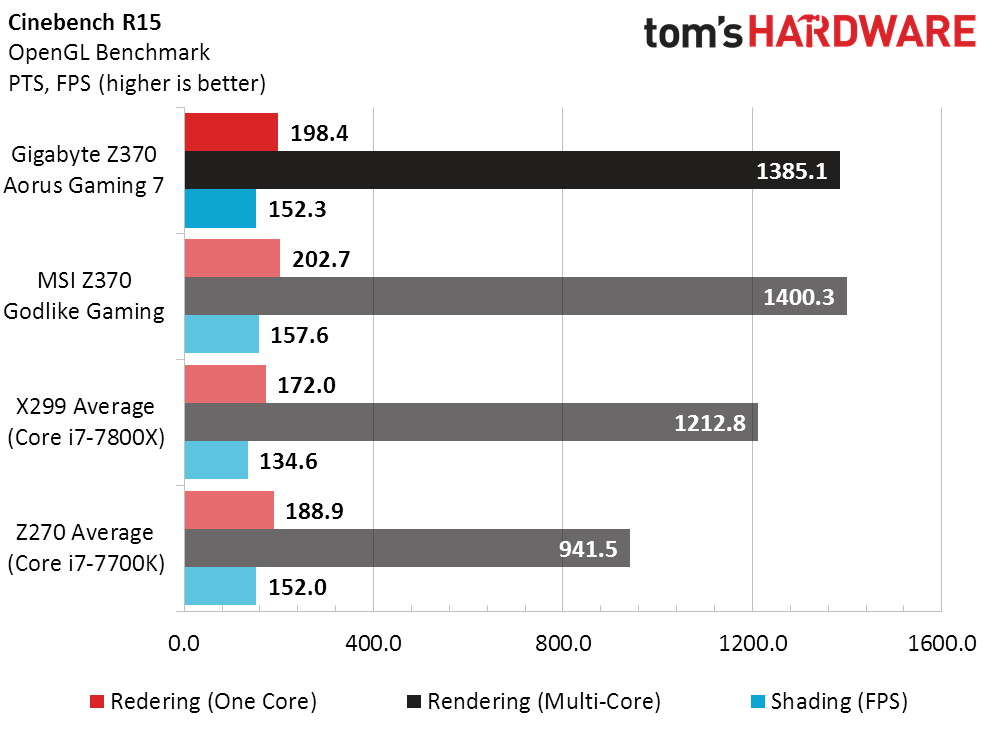
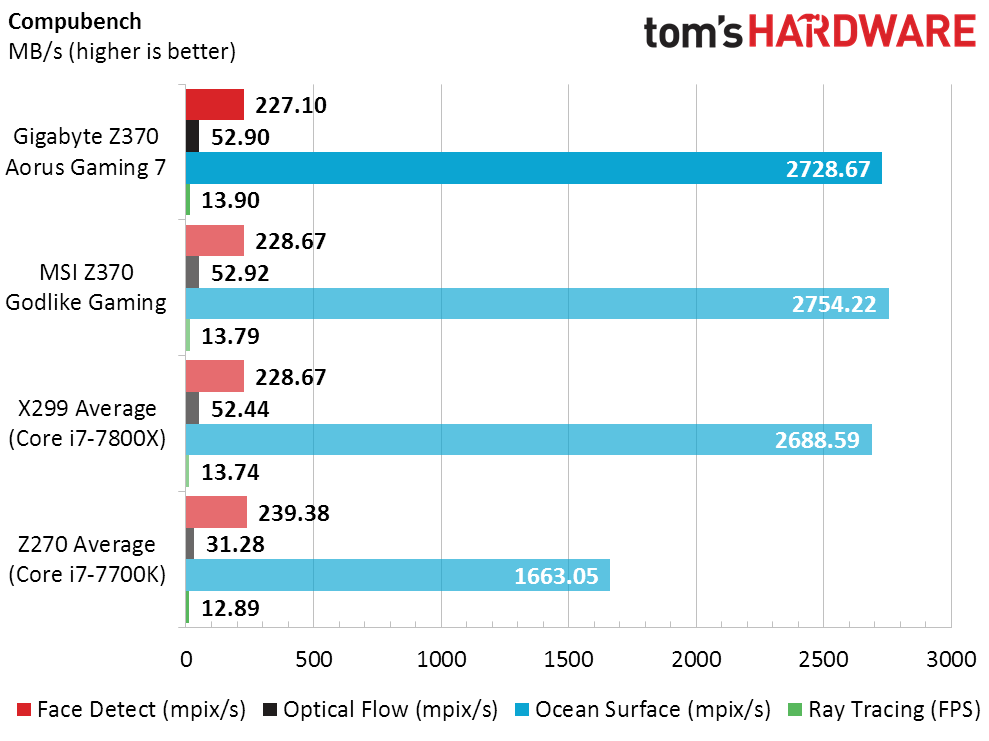
One tiny change in the results from our Z370 Godlike Gaming review is that Gigabyte’s aggregate memory bandwidth score drops from 25.6 GB/s to 25.3. That’s because of a previous transcription error of the actual 25.26 GB/s result, which was too small an error to warrant a review revision.
3D Games
The Z370 Aorus Gaming 7 has a couple gaming losses that exceed its competitor’s 0.5% overclock, yet even the largest differences are too small to notice in actual game play.
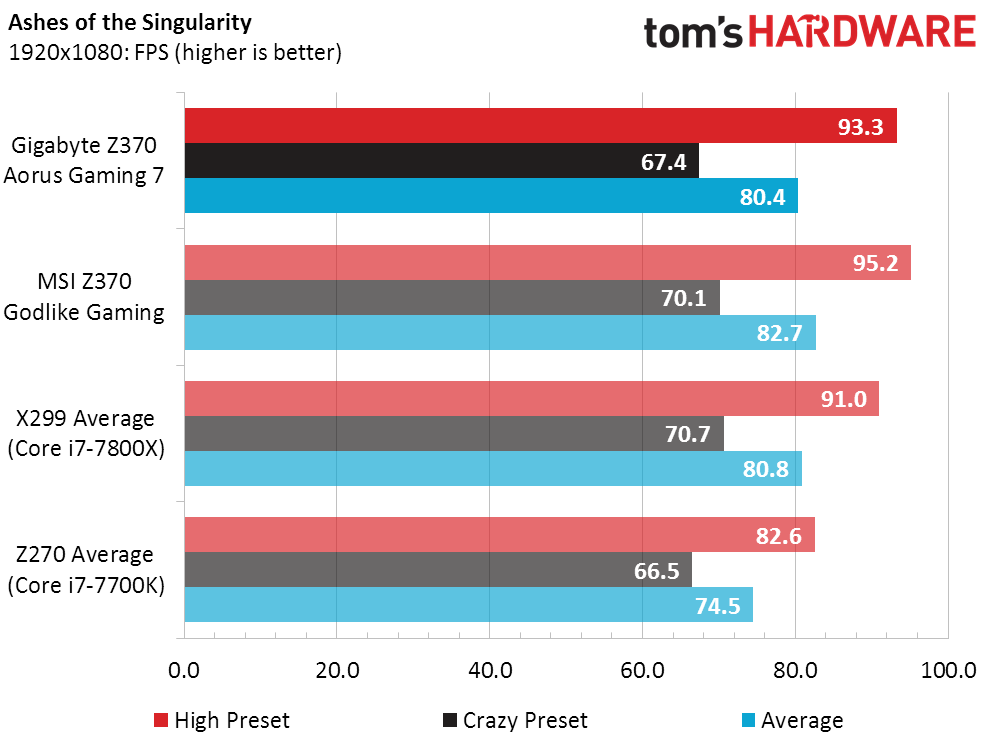
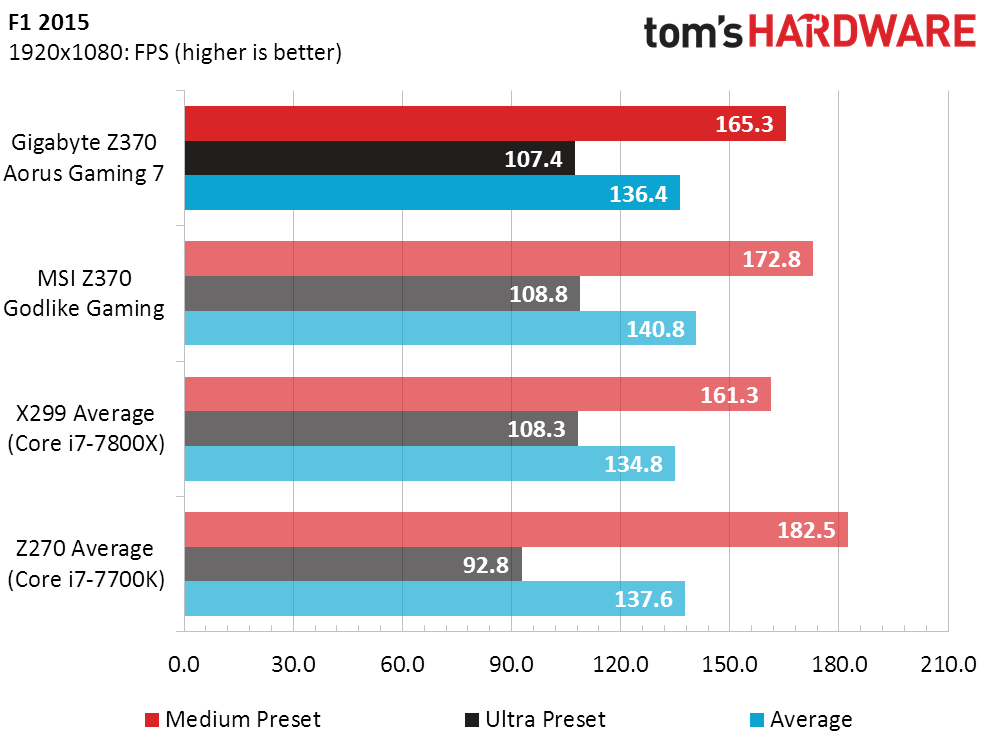
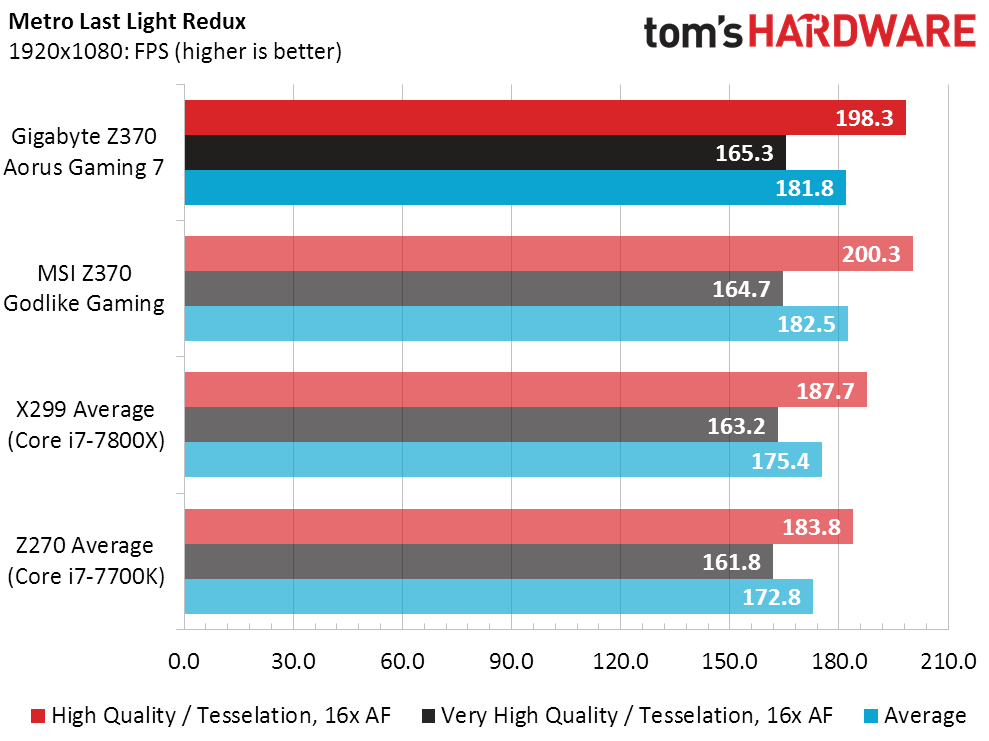
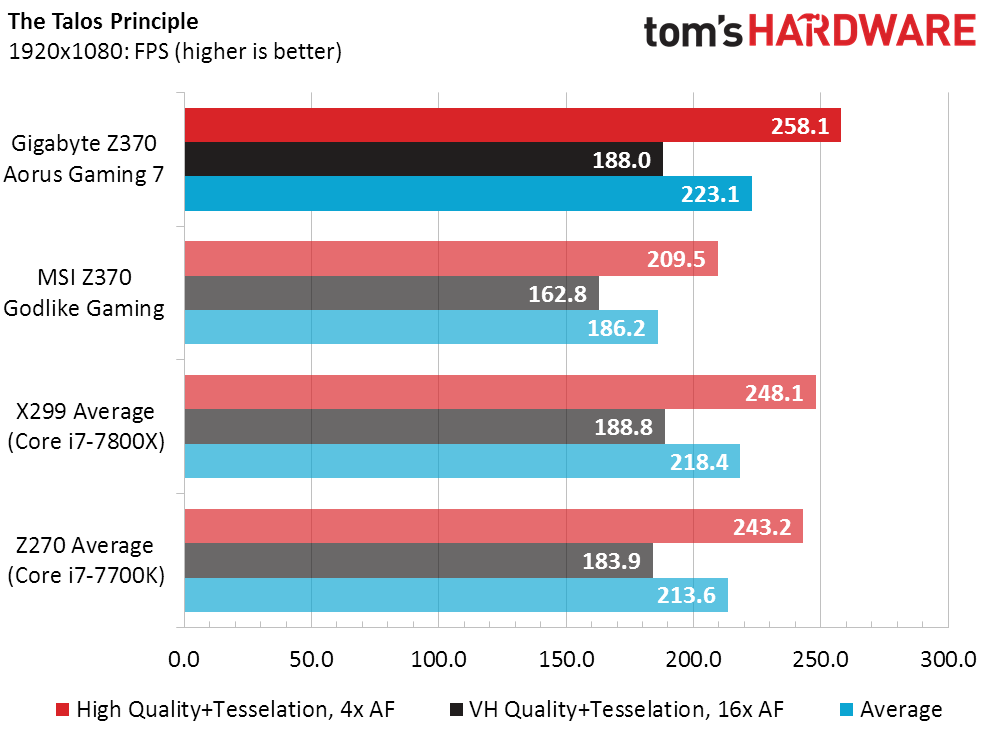
Differences in Talos are all about the game’s Nahimic Audio Solution compatibility, as the competing Z370 Godlike Gaming includes that software and its use imparts a framerate hit. A look back at that board’s review reveals higher frame rates with the software disabled.
Timed Applications
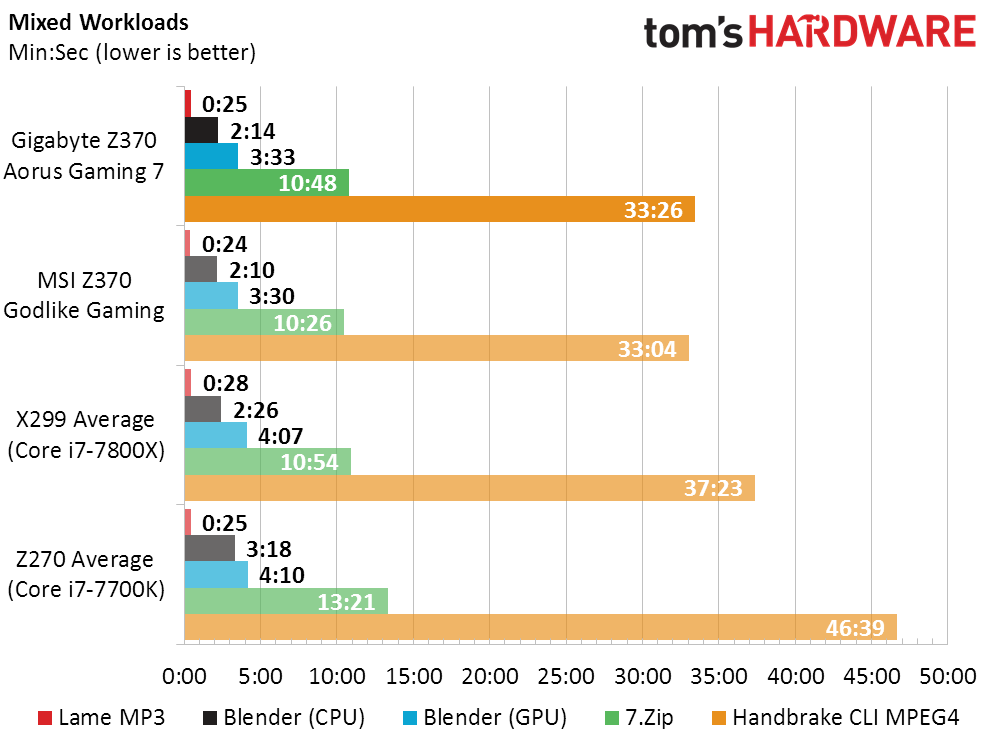
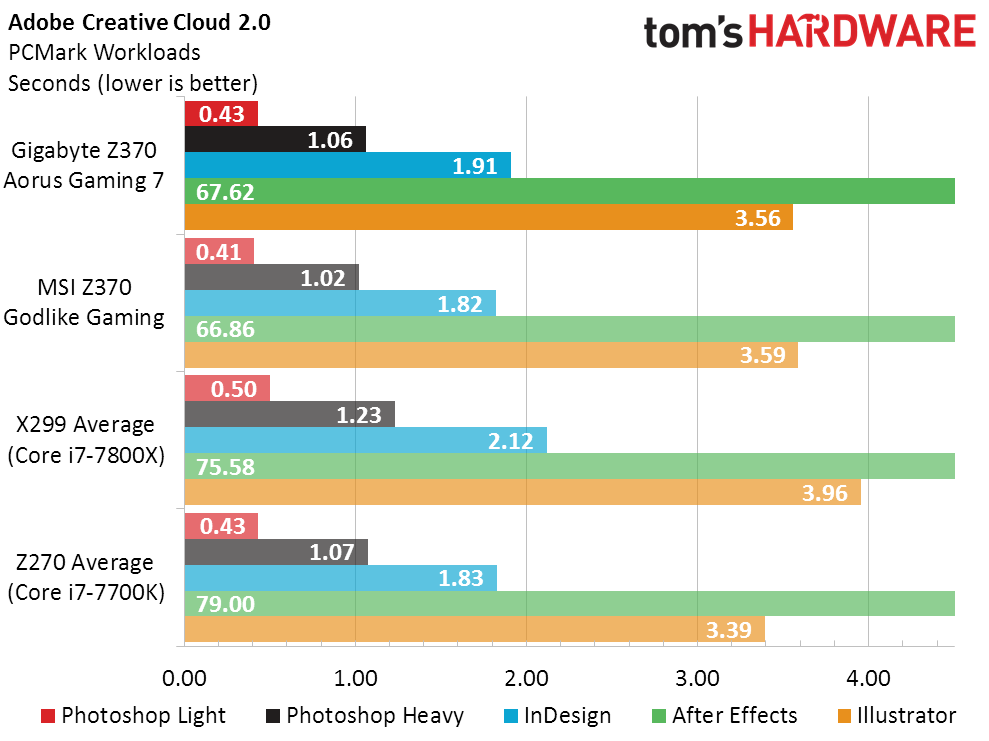
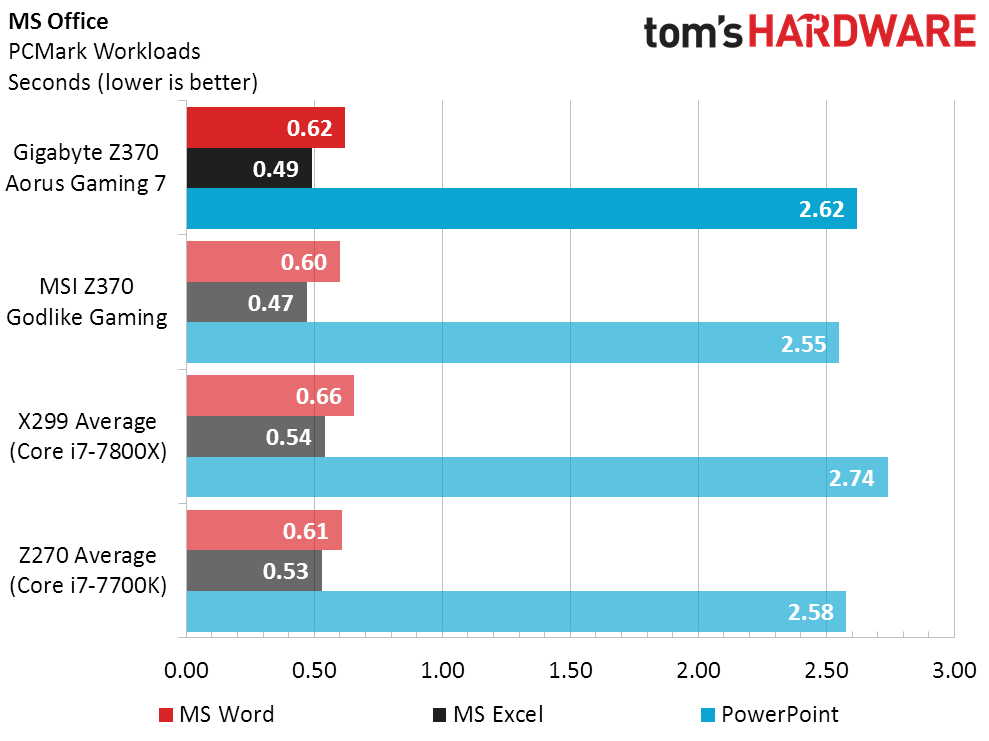
Lower is better in timed applications, and a few of the Z370 Aorus Gaming 7’s losses again exceed the 0.5% overclock of the competing Z370 Godlike Gaming. Combined performance differences remain within 2%, however.
Power, Heat, & Efficiency
The Z370 Aorus Gaming 7 has appeared adequate through all of the tests so far, but we did find a small problem upon further examination: Its default CPU core voltage is 1.200V, slightly exceeding default settings. The impact this has on power consumption and heat production is far more relevant to our analysis:
Get Tom's Hardware's best news and in-depth reviews, straight to your inbox.
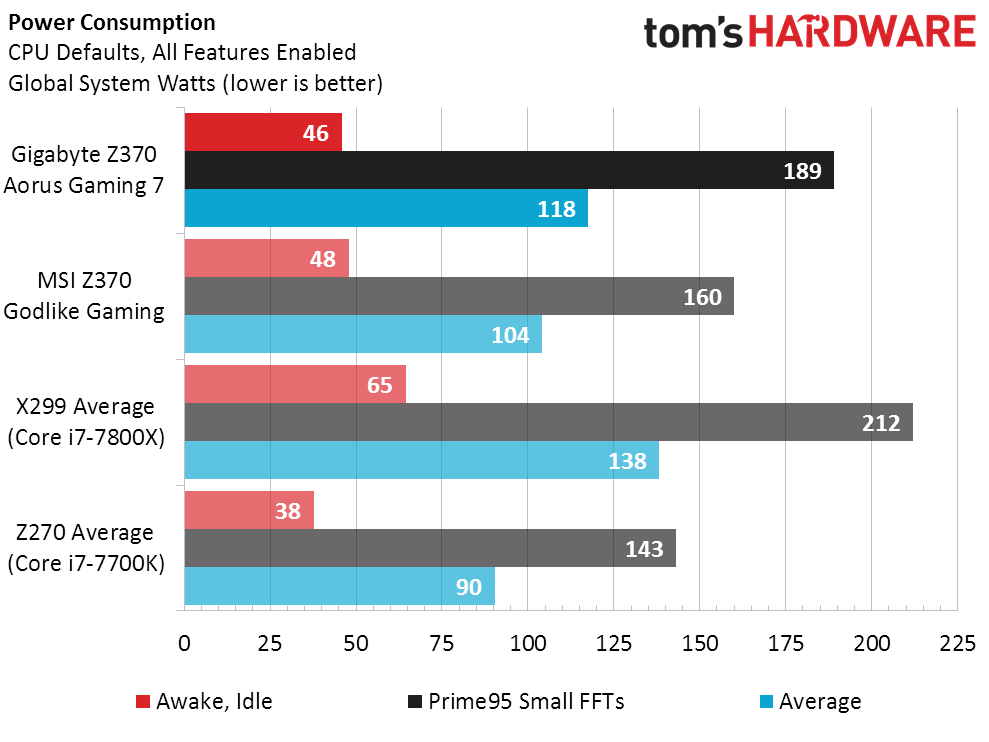
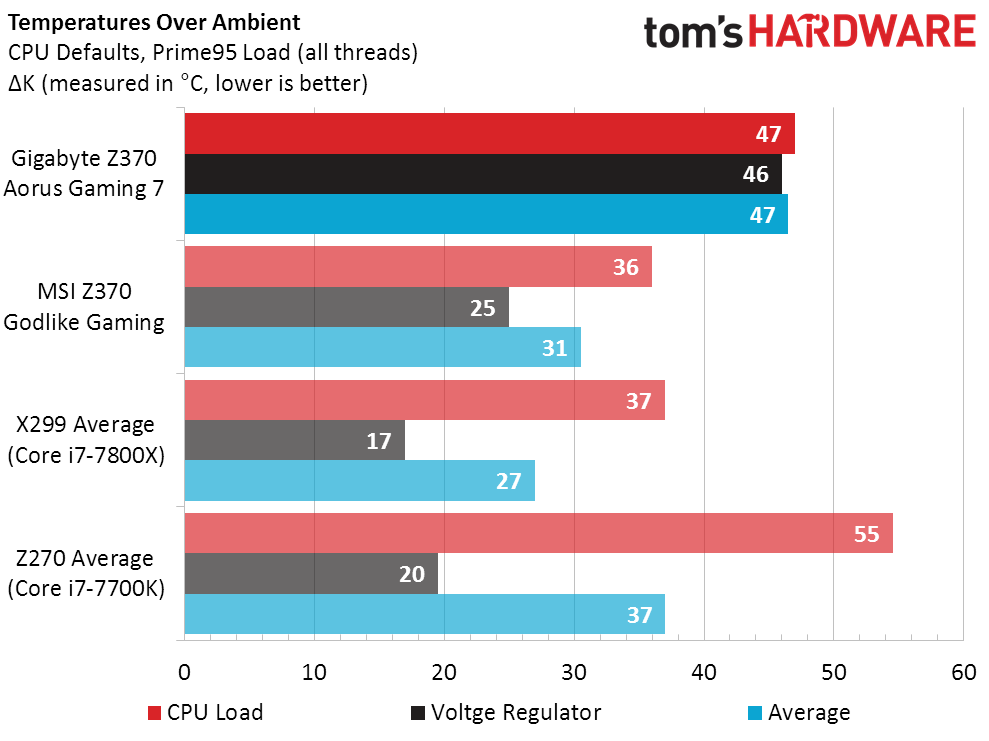
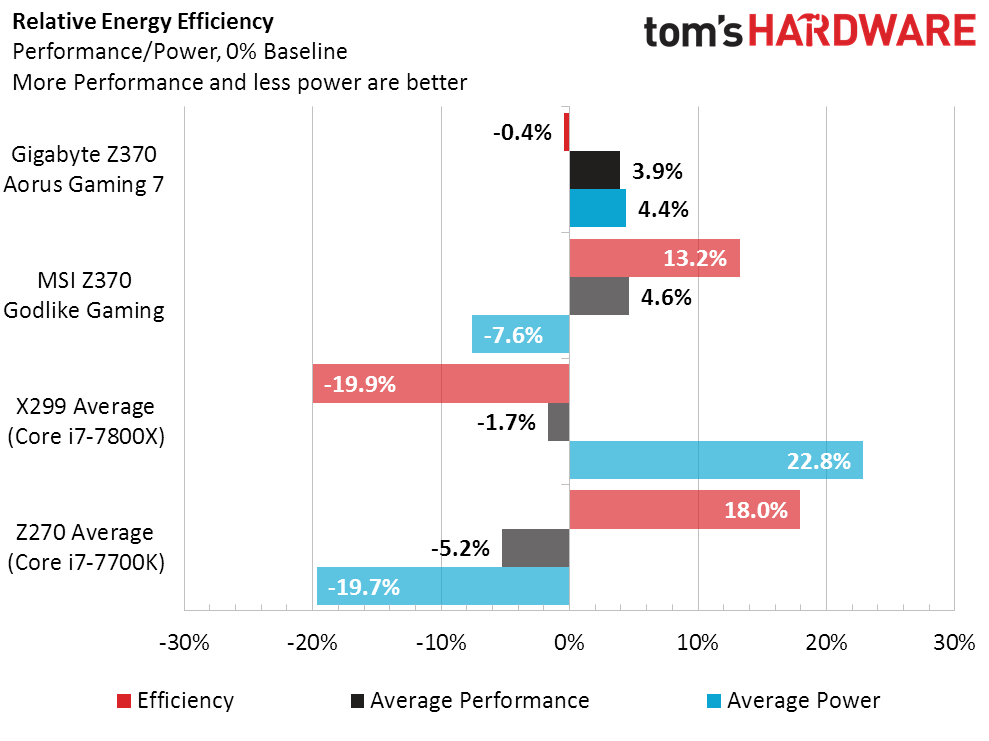
In spite of its reasonable performance, the Z370 Aorus Gaming 7 is less efficient (by more than 13%) than the fully-loaded Z370 Godlike Gaming. This probably won’t matter to overclockers who use fixed voltage anyway, but it would have been a huge problem in a non-performance-enthusiast application.
Overclocking
The Z370 Aorus Gaming 7 does a good job overclocking within the thermal limits of our CPU, matching the ultra-expensive Z370 Godlike Gaming.
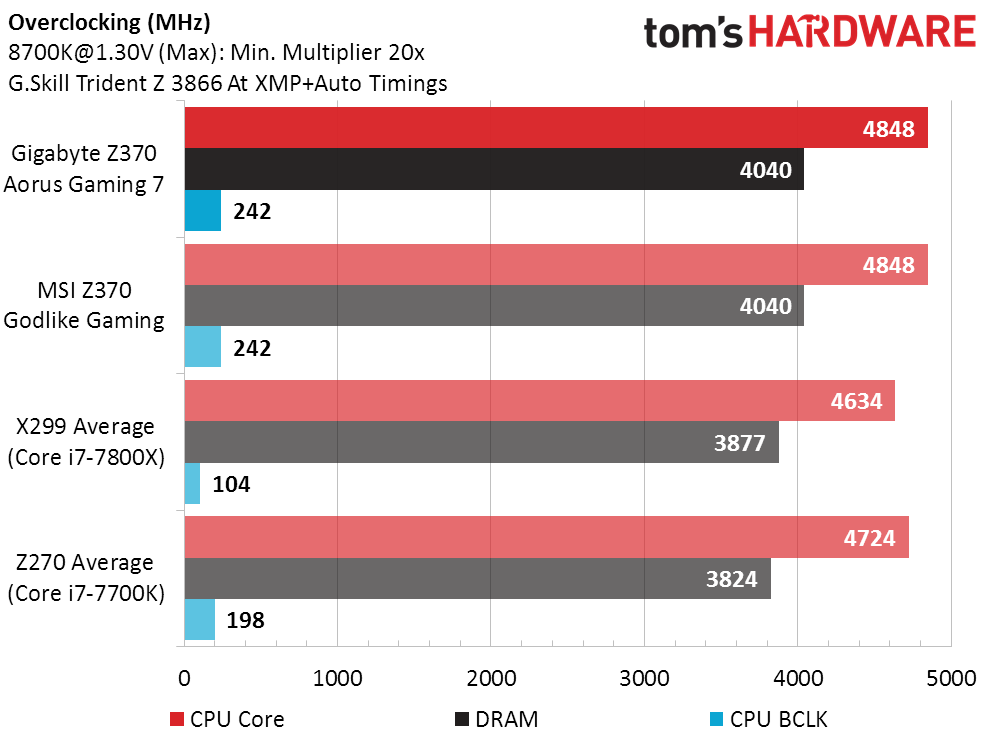
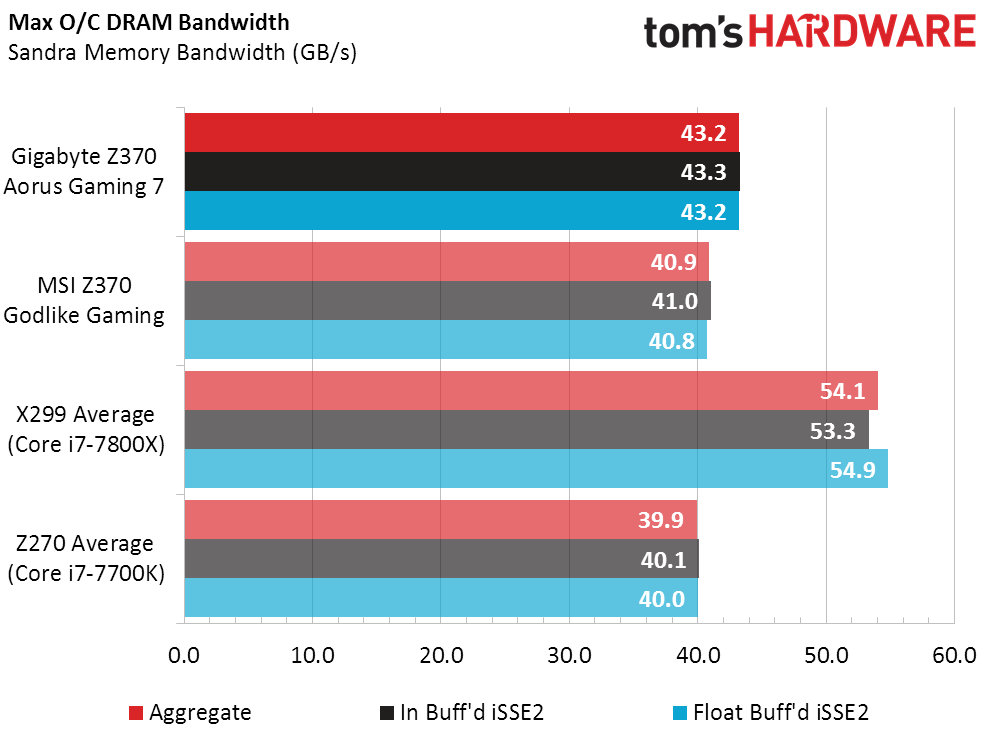
The Z370 Aorus Gaming is even able to take a small lead in overclocked memory bandwidth, proving the worth of its O/C in at least one respect compared to its rival.
Value
Determining value this early in the review process is complicated by the lack of a definitive answer for the difference in pricing between Z370 boards and the Z270 ones they potentially replace. Right now that difference appears to range from $0 to $30. If that difference were $30 consistently, the Z370 Aorus Gaming 7 would be on the precipice of average value. And if we compare performance, it looks like a winner mostly because we haven’t tested any of the $0-price-premium Z370 motherboards yet.
Add in the price of the CPU, and the Z370 Aorus Gaming 7 even looks like an average (or on par) value compared to our entire Z270 class.
We have an award for products that meet or slightly exceed our expectations without being priced into negative value territory, yet the only way the Z370 Aorus Gaming 7 can get that is if we consider the worth of its lighting. Other features such as the premium audio DAC and software suite are easily offset by the added on-board components of certain competitors. While I’m loath to use lighting as a justification for an award, I’m sure readers who build show systems will be put off if I don’t. It’s my job to represent them too, and so the Z370 Aorus Gaming 7 gets our stamp of approval.
MORE: Best Motherboards
MORE: How To Choose A Motherboard
MORE: All Motherboard Content
-
AcesB >But does it have LED lighting?Reply
LOL!
I'm still wondering why there so many people obsessed with LED decoration. Some PC is fancier than a Christmas tree! It's a good time to be an LED manufacturer or just sell it. -
Lucky_SLS Looking at the specs, I feel that the best bang for buck z370 is the Asus tuf plus gaming for 150 bucks.Reply -
mixacias63 I need a motherboard that has Thunderbolt 3 within the motherboard. They removed that feature with upgrade. I don’t need the lights. I need Thunderbolt 3Reply -
Mr5oh Not to mention the built in LEDs in everything never match each other which is very aggravating... Another thing I find aggravating is when they starting cutting out rear USB ports. My latest motherboard is a high end motherboard and it has multiple spots to hook up front USB ports, but how many cases really have more than 2 front USB ports. Not to mention who wants things plugged into the front of their case? Am I the only want who runs out of rear ports and find's USB hubs unreliable or slow, no matter what brand? D-link, Anker, (all powered hubs) doesn't seem to matter, either they put my devices to sleep and don't wake them when needed, or they don't successfully transfer files during large transfers.Reply
I haven't had enough USB ports since my Haswell build... (Currently using a GA-270X Gaming 7 Board and 7700K) -
Crashman Reply
Best comment yet! I don't need Thunderbolt 3 but I can at least understand that as a legitimate need.20269194 said:I need a motherboard that has Thunderbolt 3 within the motherboard. They removed that feature with upgrade. I don’t need the lights. I need Thunderbolt 3
We really need to ditch the notion that USB 2.0 should be removed from the I/O panel, since most people are using at least two such devices. Anyone who says "but USB 3.0 supports those devices too" is probably missing the point on resource allocation: USB 2.0 doesn't even require HSIO.20269681 said:Not to mention the built in LEDs in everything never match each other which is very aggravating... Another thing I find aggravating is when they starting cutting out rear USB ports. My latest motherboard is a high end motherboard and it has multiple spots to hook up front USB ports, but how many cases really have more than 2 front USB ports. Not to mention who wants things plugged into the front of their case? Am I the only want who runs out of rear ports and find's USB hubs unreliable or slow, no matter what brand? D-link, Anker, (all powered hubs) doesn't seem to matter, either they put my devices to sleep and don't wake them when needed, or they don't successfully transfer files during large transfers.
I haven't had enough USB ports since my Haswell build... (Currently using a GA-270X Gaming 7 Board and 7700K)
-
James Mason Reply20270197 said:
Best comment yet! I don't need Thunderbolt 3 but I can at least understand that as a legitimate need.20269194 said:I need a motherboard that has Thunderbolt 3 within the motherboard. They removed that feature with upgrade. I don’t need the lights. I need Thunderbolt 3
We really need to ditch the notion that USB 2.0 should be removed from the I/O panel, since most people are using at least two such devices. Anyone who says "but USB 3.0 supports those devices too" is probably missing the point on resource allocation: USB 2.0 doesn't even require HSIO.20269681 said:Not to mention the built in LEDs in everything never match each other which is very aggravating... Another thing I find aggravating is when they starting cutting out rear USB ports. My latest motherboard is a high end motherboard and it has multiple spots to hook up front USB ports, but how many cases really have more than 2 front USB ports. Not to mention who wants things plugged into the front of their case? Am I the only want who runs out of rear ports and find's USB hubs unreliable or slow, no matter what brand? D-link, Anker, (all powered hubs) doesn't seem to matter, either they put my devices to sleep and don't wake them when needed, or they don't successfully transfer files during large transfers.
I haven't had enough USB ports since my Haswell build... (Currently using a GA-270X Gaming 7 Board and 7700K)
No way anyone needs thunderbolt-3 on a desktop PC.
Thunderbolt 3 is two things, USB-C and Displayport 1.2 combined, with a 40GBps transfer speed.
So unless you're plugging your Macbook pro into a dock connected to a 4k monitor or 2, you don't need Thunderbolt 3.
The motherboard has a DP 1.2 port on it, and a USB C port.
You DO NOT need both of those combined on a DESKTOP motherboard.
AND no CPU/APU could provide that amount of graphical power anyways, so there's no reason for anything better to be on the mobo.
